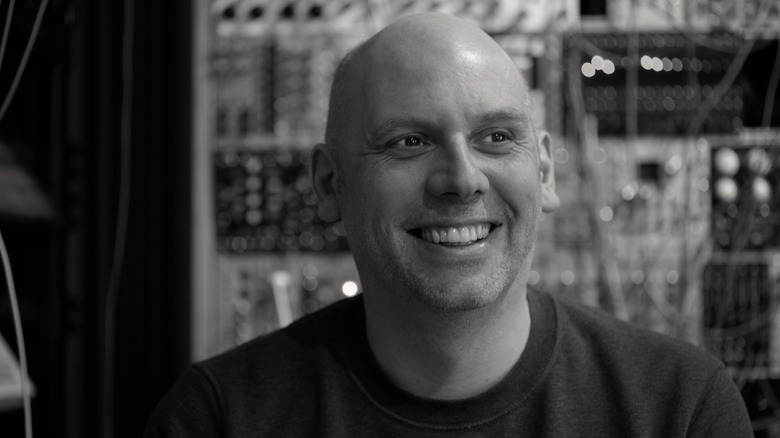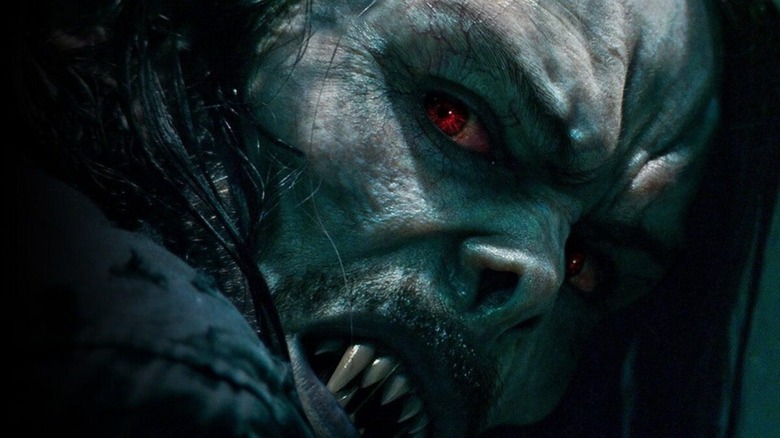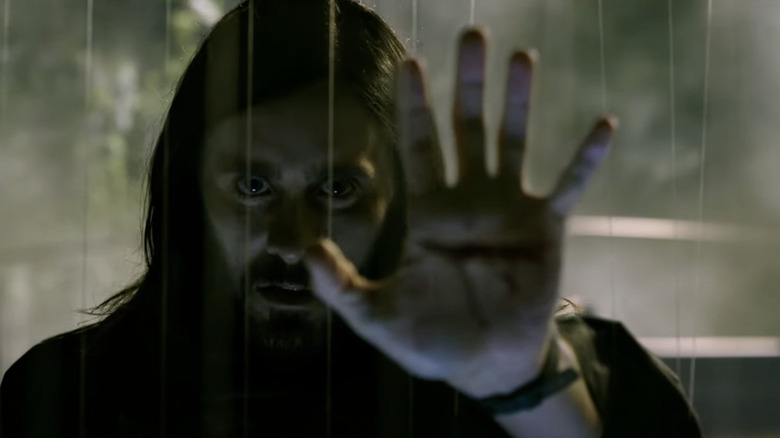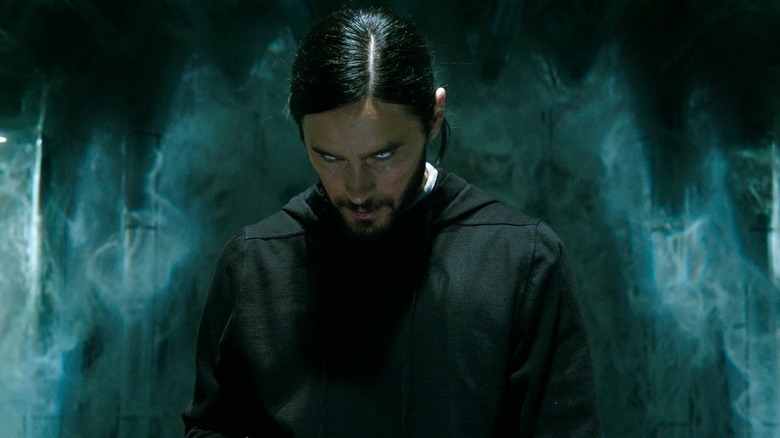Morbius Composer Jon Ekstrand Wanted To Pay Homage To John Carpenter [Interview]
Composer Jon Ekstrand and director Daniel Espinosa go way back. They went to film school together, where they collaborated, partied, and bonded over movies. After years of collaborating on movies such as "Snabba Cash," "Child 44," and "Life," they've now teamed up for their first comic book movie, "Morbius." According to Ekstrand, they approached the music with horror, not capes, in mind.
The two constantly referenced the movies and electronic music they obsessed over back in film school, where Ekstrand studied to become a sound designer, not a composer. They often talked "The Terminator" and John Carpenter films, who was, from the sound of it, the main influence here for Ekstrand. Recently, the composer talked to us about his love of Carpenter, his collaborations with Espinosa, and more about composing "Morbius."
'Drum like you mean it'
You go really heavy on the drums in this score, especially in "The Investigation Begins." How hard did you want to go on the drums?
Obviously it's a superhero movie and we really wanted a drive in it, and I think it was really a choice that we made early to make it this hybrid score with a lot of percussion and a lot of percussion-driven action cues, and also to blend the orchestra but always to be synth-heavy on the score. Drum like you mean it. Also, I think it's a lot about my composing style. It's really, "Do it like you mean it." Don't shy away from it. Most of the drums, especially on that cue, it's a little bit of homage to the movies that I grew up to see, like the old Carpenter stuff and "Terminator" and so on.
You and Daniel talked a lot about Carpenter, right?
Yeah, we did. I think it was clear when we did this, even on the script stage, when Daniel approached me on doing this, we talked about that. But this sounds like a blend of doing a homage to all the old synth scores that we listened to when we grew up, and a homage to the '90s electronic music that, when we were in our 20s, we really liked to listen to.
John Carpenter, of course. He's the godfather of those kinds of scores. I usually say that you have to do it like you mean it, and I think John Carpenter's scores are so ballsy. I'm not saying they're simple at all, but they're so minimalistic and it's so efficient what they're doing. It was really cool to actually be able to be a little bit in that world and really take inspiration from that.
What else do you appreciate about Carpenter's scores?
It's the different time signatures, and he has his own melodies and scales that he uses and so on. If you look at "Assault on Precinct 13," I would say the balls to almost start every cue with that just sequent noise. I think it's brilliant because it sets a tone. I wouldn't say that it's complex, but it's daring in a way and I think that it's a really, really cool thing.
You have a surprising amount of melancholy in your score.
We didn't want to do the classic generic superhero score, and Morbius isn't that classic superhero guy. Yeah, he is curing himself. He has a blood disease and everything. So there is a certain melancholy because he's going to a certain death, in a way, with his disease. Also, I am from Sweden and I like emotional music, and I think you can bring that in on a movie like this. Because you want to feel something, too, you know? I think that is important, especially in these kinds of movies. I think it's important to feel something for the characters, and it's not just action and full-on speed.
An example is the kid's flashback. That's six minutes of music. How'd you choose to rely more on strings than synth there?
It's strings, of course, and there's a couple of synths, also. The piano is one I have in my studio, and it's in really bad shape, so it's not super finely tuned. It's doubling the piano notes, and I really like that doubling flavor in between those instruments.
And then it's me also doing a little bit of droning on my cello. I can't play cello at all. I actually am not good at playing any instrument. I'm pretty lousy on all instruments, but I play a lot of them, but I'm not really a virtuoso on any instrument. I like doing textures with the cello, and especially for this one, I did some of the effects and tried to find out where these sounds with the cello and the strings. Because, another thing — I'm maybe jumping ahead here a little bit.
No, please go ahead.
But we really wanted to have the orchestra sound like bats a lot of times: bat wings, bat screams. We did a lot of experiments about finding high-pitched sound. We actually pitched sound later on that's supposed to be echo signals, and thinking about bats and how bats communicate and trying to make sounds that had a slight resemblance to that and trying to give the score a little bit of a bat sound feeling over it.
How often were you using bat sounds in the score?
I have a friend that is a sound designer in Sweden. I used to be a sound designer, but he had a lot of nice bat recordings, bats flapping. I got a pretty good library from him. Then we started doing textures of it, synthesizing and putting them through my modular system, pitching them down just to get a texture of the beginning of a cue. It was a fun and experimental stage for this film.
I believe in, when you do stuff like that and you really experiment, it's always — music by mistake can be sometimes fantastic. So something you didn't expect just happened, but it's just, "Oh, my God. I hear this overtone of this bat noise that is just amazing. Let's try to carve that out and make something just out of that." It's a super fun process.
'My agent told me then, 'If you are making it through this one, you will make it through any other movie''
What was some of the '90s music you and Daniel referenced?
I grew up listening to The Chemical Brothers, all those things. I was a techno head from the mid-'90s. And growing up in Europe, the techno scene was quite big then. I think that a lot of the sounds are a homage to those '90s sounds and doing distortion drums, having the distorted 303s and doing these techno alarm sounds. Also, Daniel loves that era of music. Daniel and I have known each other for 25 years, so we went to the same parties as teenagers, so our references are the same.
Was "Snabba Cash" the first project you and Daniel worked on?
No, no, no. The first movie I wrote the score for him was his graduation movie for the Danish film school. Since then, we've done all his movies except "Safe House” together. Studios were worried when he did "Safe House," because it was his debut in Hollywood. They didn't want to bring in a debut composer for that movie. It was good, because I wasn't ready back then for a big project like that.
Something is happening when you leave the Swedish film industry and we go to the States and do studio movies. The projects are just much bigger and the pressure is so much bigger. Maybe I wasn't happy then that I didn't get it, but now with where I am now, I'm pretty pleased that I didn't get that one.
When did you feel ready to work on Hollywood movies then?
When we did "Child 44," that was pretty stressful, too, because it was my first Hollywood movie, and it was a project that had a lot of problems in the production. Without saying too much, edits and so on. It was a problematic production. My agent told me then, "If you are making it through this one, you will make it through any other movie." I made it through.
After that, I needed a couple of months of just nothing, but I knew, "Okay, I can do this and I'm pretty decent at it. I think I'm bringing something new to the table." But I still love doing Scandinavian movies because it's also something else. You don't have the control from the studio, so it is much more, in a sense, more artistic work you can do and be much more minimalistic.
Did you get a lot of notes for "Morbius"?
Not to say too much, but I was surprised that there were so few notes from the higher-ups on this project. From my standpoint, it went really, really smoothly. I mean, except that we were scoring through a pandemic, so all the logistics were hard. Everything just took twice as much time.
I sat in Stockholm scoring or writing all the music and then we went to L.A. to record. I think we were the first one to record on the stage during the pandemic. We were the first city to shut down. Everything was a little bit new, how the spacing between players, nobody had done this before. We were a little bit of a guinea pig for social distancing, but it worked out great.
For superhero movies, composers often say they want to try something new, but you also have to deliver on certain expectations. How do you strike that balance?
I think we wanted to go darker and really make him a monster, because he is a monster. It's almost like Frankenstein. He is Dr. Frankenstein. I think it was more for us to find the horror feeling of the score than making it feel like a superhero score. Of course, you always have to sort of bring in the epicness and it's like, "Okay, here we go." It's there, but always to keep it on the dark side. I think that was the key word to it. Always keep it to the dark side.
How'd you approach the Morbius theme?
It is a very simple theme. It is in the opening. We reuse that and it comes back in maybe other keys and so on. It's always coming back. It's not like a "Superman" theme. It's definitely not. We didn't want to do that, because he isn't that kind of character, either.
What about the transformation sequences? Did you really want to lean on horror there?
I always said to Daniel, when he was in the studio, it was always like, "He's alive." That it's this old, horrible Frankenstein. We always had that [idea] that carried us through the whole score, almost. Yeah. It was really fun to have. It's kind of nice to find these kind of things that you hang on to and keep them going through the score. That was really a sentence that we used like that.
'That's paradise. That doesn't happen here'
It's been interesting to watch Daniel go from where he started with "Snabba Cash," which probably remains his best movie.
No, definitely. Definitely. When he said he was going to do that movie, I read the book and I thought the book was really, really bad. "My God, this is just gangster chic, kind of romanticizing gangsters." I told Daniel that. He's like, "No, no, no. But you have to trust me. I'm going to do it my way." And it's like, "Yeah, I'm definitely going to trust you."
When I saw what he was about to do with "Snabba Cash," I was like, "Okay." Daniel can actually get a pretty bad story — from my [view], when I think it's bad — and make it really, really good and get that grittiness. I think that is what I really like working with Daniel, because he always finds grittiness to it. I think that it's super interesting and really, really fun to work with as a composer.
Obviously, movies of this scale change a lot. What changes required new music?
I think the kid's flashback was a cue that changed throughout the process where we wrote more. We found out that we actually could go more emotional on that one, so I think that was one of the ones that we could return to. And then also, I think it's the cue "Superhuman," was the one that we really liked to come back to. I think "Superhuman" is probably one of my favorite cues.
Of course, these movies will always change. The studio, because they put in so much money into it, they want it to be as good as it possibly can. But that's something you just have to deal with as a composer and understand that the movie is changing all the time. In Sweden, we used to lock edits, and then you have the sound edits, and you have sound for like eight weeks and then you have a locked edit for eight weeks. That's paradise. That doesn't happen here.
I think it's about being on your toes and really being up for the changes that are coming. But of course, it's a lot of re-conforming and so on to new edits. But for this one, it felt that it wasn't that much, in a way. Of course, they changed a couple of things, but it wasn't making my life miserable in a way, because it is changing. You kind of knew that, "Yeah, this is probably going to flip a little bit or something like that. Okay, let's do this."
Earlier you said how you used a damaged piano. Do you often use damaged instruments?
Yeah. The thing is that I think it's something that comes from scoring movies in Scandinavia, because you don't have the big budgets. So you have to play with the instruments yourself sometimes. I did another movie now that is, I think it's not official yet, but it's going to Cannes and it's a Swedish movie called "The Opponent," which I wrote together with another friend. We decided when we saw it, we're going to play all the instruments ourselves. We're not going to bring in any musicians. Everything is just live takes and there are so many mistakes and so on. It gives it another life.
I started playing the key harp, the nyckelharpa, which is a Swedish folk instrument, too, which I absolutely cannot play, but the mistakes on that one is amazing when you get fourth tones and stuff like that. I think it is really nice to have the time to find those kinds of wrong plays and actually use them in a score.
"Morbius" is now playing in theaters.



